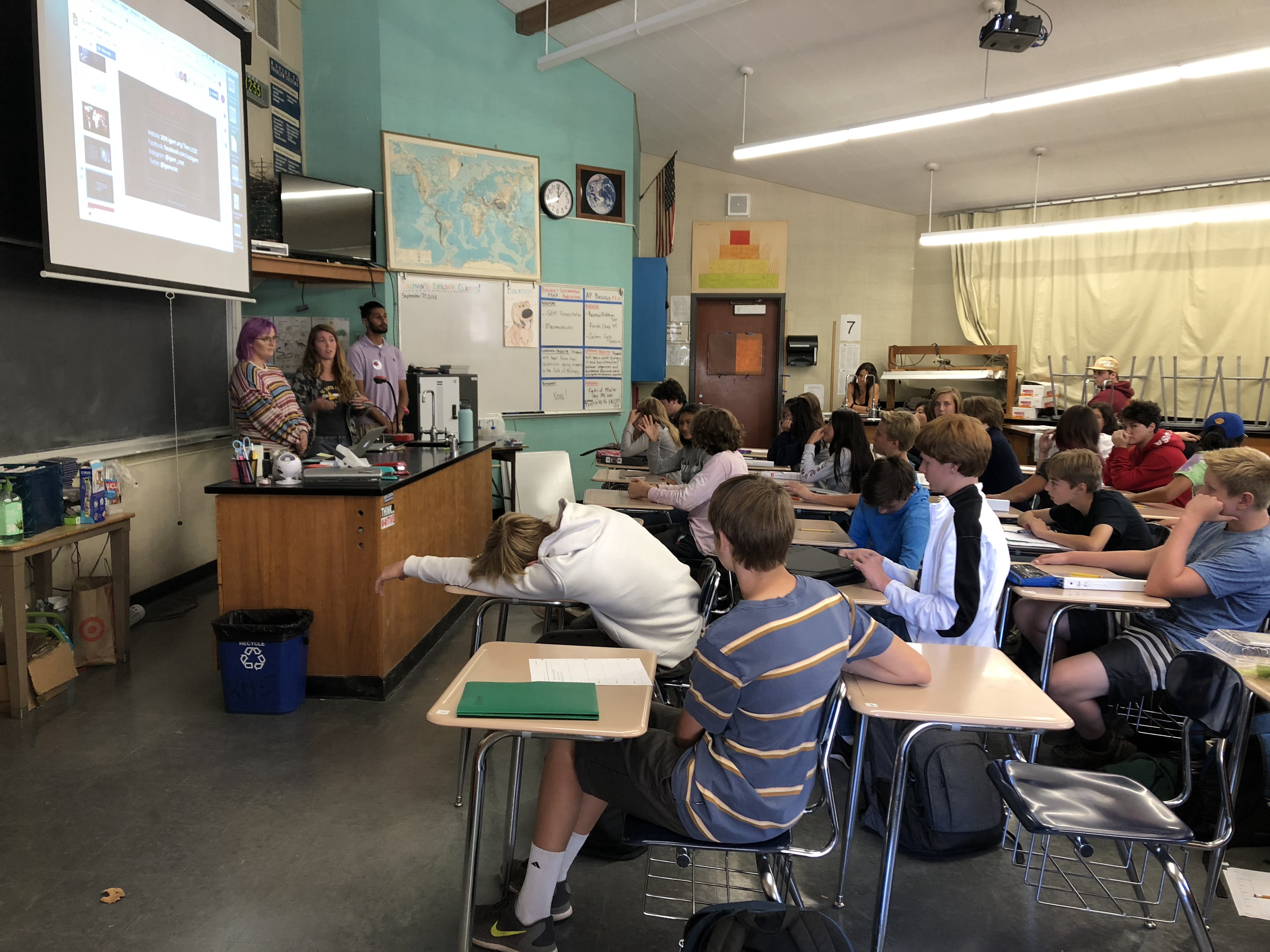Public Engagement
Overview
Our team focused on both global outreach and on connecting with our local community. Our goal was to not only make a difference in the world, but also help improve our local community. To accomplish this, we decided to reach out to local middle schools and high schools, present our project and iGEM to faculty members and students, and gave a TEDx talk.
San Lorenzo Valley High School (SLVHS)
We want to inform and inspire upcoming generations, so we reached out to local schools and asked if they would let us present to their students. We contacted a total of 15 schools (four middle schools, nine high schools, and two vocational/private/alternative schools) in a 75-mile radius. So far, six of these 15 schools have shown interest in us presenting to one or more of their classes.
While we have several school presentations planned for after the Jamboree, SLVHS was the only school who planned for our presentation to be before the Giant Jamboree. We spoke with two SLVHS biology teachers, Aria Bauman and Stephanie Beck, who were interested in us presenting to their freshman biology classes. We created a presentation similar to our Bioethics class presentation, but with less technical information since the level of knowledge with high school freshmen isn't as in depth. Three presentation groups, each with three presenters (one who discussed iGEM, one who discussed our scientific research, and one who discussed our human practices), shared seven total presentations at SLVHS. We worked closely with the two biology teachers to assure our presentation wouldn't intimidate or confuse any of the students. Students from each class asked us questions about our work, our experiences as college students, and even about creating an SLVHS iGEM team.




UCSC 9th Annual Physical and Biological Sciences Summer Research Symposium

We engaged the scientific community on campus by presenting at the UCSC 9th Annual Physical and Biological Sciences Summer Research Symposium. We created a poster that details the science and outreach aspects of our project. Three iGEM members presented the poster to various audiences. We were asked questions about distribution methods and our timeline, and people were excited to hear about the potential impact of our project.
UCSC Bioethics in the 21st Century: Science, Business, and Society
As is tradition for UCSC iGEM teams, we presented our project to the UCSC summer session class Bioethics in the 21st Century: Science, Business, and Society. The purpose of the presentation was to explain our project, gather feedback on the ethical implications, and inform students on campus about iGEM. Prior to speaking to the students, we considered potential ethical issues with the project, such as cultural differences regarding attitudes towards contraceptives and biosafety of engineering the Yali genome. Our presentation included a brief overview of the iGEM competition, an explanation of the goals of PoPPY, a discussion of the genes to be inserted, the methods we considered for insertion into the genome, and the questionnaires we sent out. Following the brief presentation, the class broke into smaller groups iGEM members and students. In those small groups, we discussed the potential ethical issues of our project in more detail. Many students offered perspectives on our project that we hadn’t considered before. For example, some students offered additional questions to improve the questionnaire. Sandra Dreisbach, one of the Bioethics professors, also encouraged us to contact the UCSC Institutional Review Board (IRB) to have them review our questionnaire and approve it for distribution. As part of the final project for their class, the bioethics students will make recommendations on how the ethics of our project can be improved.


OPERS Festival 2018
At the beginning of each year, UC Santa Cruz throws a festival on campus where clubs, organizations, and research teams come together in one place to showcase their work and what is to come in the following year. This festival is a great opportunity to get the community excited about extracurricular activities and encourage them to participate, and iGEM was no exception. To prepare for the festival, our team worked on perfecting a poster to display at the booth. We also created small quarter-flyers to hand out to those interested. The flyers contained general information about iGEM and how to go about joining the following year's team. We printed a total of 200 flyers and ran out only an hour into the festival. We received hundreds of signatures of those wanting to sign up for the iGEM mailing list to learn more. All our iGEM members wandered through the festival and found strangers interested in learning about iGEM. We received an influx of people viewing and interacting with our social media pages throughout and after the festival. Throughout the 3-hour event, we got several hundreds of students excited and interested about participating in iGEM. We can't wait to see what the UCSC iGEM 2019 team has in store!

TEDx SJSU Presentation
In early September, our team came across a TEDx talk in San Jose looking for presenters. The TEDx SJSU theme was "breaking ground", and our team felt that our iGEM idea was perfectly on theme. A few of our teammates wrote a sample itinerary for the TEDx talk and sent that to the coordinators as our application. We were accepted as one of the presenters only a week later. We chose Laura, a teammate with a strong public speaking background, to write a speech detailing our project, human practices work, and how our project "breaks ground". She gave a 15-minute presentation to audience members of various backgrounds: Harvard professors, high school students, SJSU staff and professors, and college students. She also participated in a brief Q&A after the presentation where the public asked her more questions about our iGEM project. We are so thankful for the opportunity to share our scientific ventures with the surrounding community. We are so proud of Laura!



